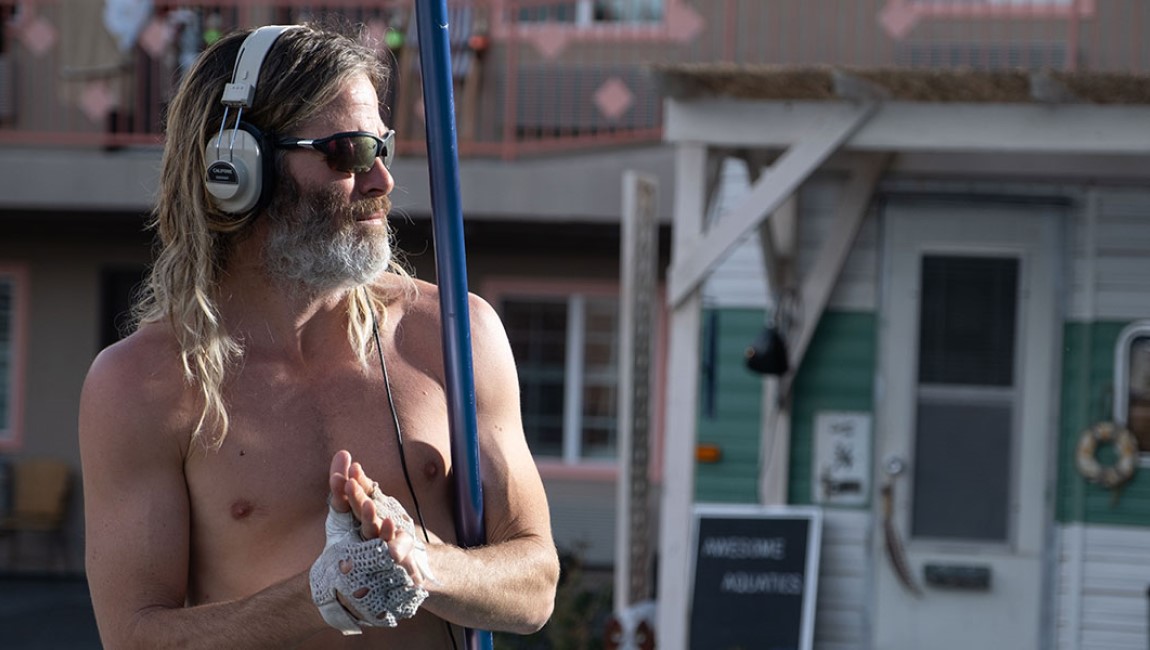In light of the ongoing SAG strikes, this year’s TIFF featured a bevy of actor-directors, (generationally) ranging from Michael Keaton to Finn Wolfhard — allowing both festival and filmmakers to dodge scab accusations or an ethics breach. One such director was Chris Pine, who skipped this year’s festival altogether, despite debuting his first directorial feature, Poolman. Filled to the brim with a plastic slacker charm and the referentiality of a high-school script with a first-time reading of Pynchon plastered all over it, Poolman boasts only one definitive claim to success: garnering the most walkouts. Co-starring Annette Bening (reading Karl Ove Knausgård), Danny Devito, and Jennifer Jason Leigh, the film follows a scatterbrained poolman named Darren Barrenman (Pine), who is trying to save Los Angeles from becoming one long bulldozed parking lot. He repeatedly goes to his psychoanalyst neighbor Diane (Bening) for life advice, while filming a documentary about his advocacy work with her husband, Jack (Devito), a talented but steadfastly unemployed filmmaker. Meanwhile, Darren immediately finds himself at odds with city councilman Stephen Tobolowsky (played by… Tobolowsky) and is embroiled in a water scandal that is comprehensible only insofar as Chinatown is repeatedly referenced to explain why a lack of water would be a problem at all.
So little time is spent on the actual context — in fact, members at the press screening were initially confused as to whether the film takes place in the 1970s or in the present day — that it isn’t even made clear that there is a drought at all, and especially not to any degree that would generate the dramatic tension necessary to guide the film forward. No, despite the geographic specificity of Poolman, the only thing distinctive about it is the pronounced slacker-comedy register adopted by Pine and his co-writer Ian Gotler, which generally revolves around a shallow, quick-pitched style of dialogue that has the dramatic and comedic nutritional value of a pack of mini-marshmallows. Superficially, it recalls something like The Nice Guys, but in place of Ryan Gosling’s effortless, quick-witted charm, the audience is left with a performance more reminiscent of Owen Wilson’s persistent whining in Midnight in Paris; there’s nothing here to effectively pull viewers into the drainpipe vortex of the film’s plot.
The nonsensical and inert mystery of Poolman is less akin to the noir charm of Chinatown (which some critics have somehow likened it to) than it is to Under the Silver Lake in its pothead-philosophy-bro’s bewildering sensibility to suggest intrigue without exploring anything with any depth. But then, even David Robert Mitchell’s work had more to offer; in that film’s moments of absolute incomprehensibility, there was at least a visual uncanniness and Pynchonian freedom of spirit that differentiated the movie from the benign forgettability of Poolman. Still, for all its shortcomings, Pine’s debut does provide a warm snapshot of Los Angeles, as he succeeds in imbuing the film with an appealing natural nostalgia, aided by his decision to shoot on film — so sad is the current state of filmmaking and its desert of originality that this decision alone is worth crediting. But ultimately, whether it’s the sun, chlorine, or weed, Pine seems entirely oblivious to just how shallow and superficially affected his first feature ends up being.
DIRECTOR: Chris Pine; CAST: Chris Pine, Danny DeVito, Annette Bening, Ray Wise ; DISTRIBUTOR: Vertical; IN THEATERS: May 10; RUNTIME: 1 hr. 40 min.
Originally published as part of TIFF 2023 — Dispatch 4.







